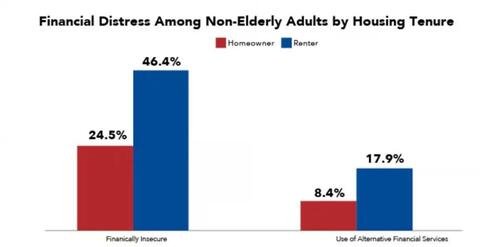
Posted on 06/05/2024 10:08:24 PM PDT by SeekAndFind
It turns out renters and homeowners are living in two entirely different economies, at least according to a new study by the Federal Reserve—which, ironically enough, made it happen.
In short, renters are in dire straits financially, while homeowners are “continuing to reap the rewards” of cheap pandemic money that left renters with nothing but inflation.
This is “complicating” the Fed’s crystal ball as homeowners continue to splurge on everything from travel to eating out, “propping up prices with their discretionary spending power.”
Of course, the Fed’s money printers are what are propping up prices. But the robust homeowner spending means they’re not seeing the distress.
That process goes on turbo when they crank up the money printers, which they did during the pandemic to the tune of $7 trillion fresh dollars—one in three.
Hence the media’s favorite economic theme these days: why Americans can’t see the glory of Bidenomics. After all, if you’re a journalist at The New York Times, or an economics professor at Harvard, everybody at your dinner parties owns a home. They own stocks. They’re doing great, regaling one another with explanations of their investing acumen.
Alas, the 90 percent aren’t at those dinner parties to regale. They can only speak in ballot boxes.
Renters are more likely to not be able to pay the electric, water, or gas bill in the past month, and they report much higher rates of financial anxiety.
This all might rankle when CNN lectures them about how amazing the economy is.
It’s a whole other world for homeowners, who overwhelmingly refinanced during the pandemic at average rates around 3 percent, taking hundreds of thousands out of their Fed-pumped homes.
They plowed a good chunk of that money into stocks, which also soared thanks to the Fed’s near-zero interest rates—the so-called everything bubble. Courtesy of the Fed.
That means homeowners actually saved money compared with pre-pandemic. They had a larger mortgage, sure, but at 3 percent, the Fed actually lowered their monthly nut.
When the smoke cleared, the money-printing orgy was a bonanza for the wealthy. And it was a cruel joke on everybody else, above all on the young stuck watching that ship sail further and further away, giving up on starting a family, instead returning to Mom’s basement to complain about capitalism.
This means that government policies are bedazzled in sweet nothings about the less fortunate or, these days, the under-represented. But when the music stops, somehow the poor don’t get a thing; it is the wealthy who got the goodies.
The solution’s easy: Get the government out of the economy. End the Fed, drain the swamp.
Of course, they’ll fight that with everything they’ve got.
They seem to forget that renters are historically more financially vulnerable than homeowners. Its not a new phenomenon.
well, they are paper profits. But tons of homeowners are paper millionaires, which is still a hell of a lot better than the poor renters who all have negative net worths dropping by the minute.
Most people don’t understand inflation.
Even at the average 3% inflation rate, if your net worth is not DOUBLING every 20 years, you are falling behind and don’t even realize it.
WHAT PANDEMIC MONEY? WE DIDN’T GET A DIME. We paid the house off several years ago, and a new H/Vac system and storm damage resulted in a new roof, upgraded out of our pockets. Property tax doubled. As did the assessment, and insurance, home/earthquake are equal but separate.
More, gas and food are up.
We are Medicare/Tricare Life, those have gone up, and coverage down.
Inflation + Wage suppression policies have been wrecking our country for generations.
It’s not good for business when 50% of the population can’t afford basics or buy their products.
Disclaimer: Opinions posted on Free Republic are those of the individual posters and do not necessarily represent the opinion of Free Republic or its management. All materials posted herein are protected by copyright law and the exemption for fair use of copyrighted works.